- Home
- Robert Jordan
Conan Chronicles 2 Page 20
Conan Chronicles 2 Read online
Page 20
Jondra and Tamira, still swathed in their borrowed cloaks, huddled close to a small fire with their heads together. They showed more interest in their own talk than that of the men.
“It was hard enough with the Zamorans,” the bony man laughed. “I thought. I would have my hide stripped off on the instant. Then that … that sound came.” He shivered and pulled his cloak closer about him. “It turned men’s bowels to water. The hillmen stood for only a moment after that, then broke.”
“That was Conan,” Eldran said from where he examined the two shaggy horses they had found wandering, saddled but riderless, in the mountains. There had been others that they could not catch. “He slew the beast of fire, and it … screamed.”
“And the Zamoran gained his victory,” Haral said, “and his glory. It will be years before the hill tribes so much as think of uniting again. He will be acclaimed a hero in Shadizar, while the Cimmerian gets nothing.”
“Let Tenerses have his glory,” Conan said. “We have our lives, and the beast is dead. What more can we ask?”
Eldran turned suddenly from the horses. “One more thing,” he said sharply. “A matter of debt. Jondra!”
Jondra stiffened and looked over her shoulder at the tall Brythunian. Tamira rose swiftly, carefully holding the black cloak closed, and moved to Conan’s side.
“I know of no debt. I owe you.” The gray-eyed noblewoman’s voice was tight. “But I would speak with you about garments. How long am I to be forced to wear no more than this cloak? Surely you can find me something more.”
“Garments are a part of your debt,” Eldran told her. He ticked off items on his fingers. “One cloak lined with badger fur. One pair of wolf fur leggings. And a good Nemedian dagger. I will not speak of a crack on the head. Since I see no chance of having them returned, I will have payment.”
Jondra sniffed. “I will have their weight in gold sent to you from Shadizar.”
“Shadizar?” Eldran laughed. “I am a Brythunian. What do I care of gold in Shadizar?” Abruptly he leaped, bearing the tall noblewoman to the ground. From his belt he produced long leather thongs like those used to tie leggings. “If you cannot pay me,” he said into her disbelieving face, “then I will have you in payment.”
Conan rose to his feet, one hand going to his sword hilt, but Tamira laid both of her small hands atop his. “Do nothing,” she said softly.
The big Cimmerian frowned down at her. “Do you hate her so?”
Tamira shook her head, smiling. “You would have to be a woman to understand. Her choice is to return to being a wealthy outcast, scorned for her blood, or to be the captive of a man who loves her. And whom she loves, though she cannot bring herself to admit it. It is a choice any woman could make in an instant.”
Conan admitted to himself that Jondra did not seem to be struggling as hard as she might, though she almost made up for it with her tirade. “You Brythunian oaf! Erlik blast your soul! Unhand me! I’ll have your head for this! Derketo shrivel your manhood! I will see you flayed alive! Ouch! My ransom will be more wealth than you’ve ever seen if I am unharmed, Mitra curse you!”
Eldran straightened from her with a grin. She was a neat bundle in the cloak, now, snugly tied from shoulders to ankles with the leather thongs. “I would not take all the wealth of Zamora for you,” he said. “Besides, a slave in Brythunia can have no interest in gold in Shadizar.” He turned his back on her indignant gasp. “You understand, Cimmerian?”
Conan exchanged a glance with Tamira; she nodded. “I have had it explained to me,” he answered. “But now it is time to take my leave.”
“Wiccana watch over you, Cimmerian,” Eldran said. Frydan and Haral echoed the farewell.
Conan swung into the saddle of one of the two horses. “Tamira?” he said, reaching down both hands. As he lifted her up behind him, her cloak became disarrayed, exposing soft curves and satin skin, and she had to press herself to his back to preserve her modesty.
“Be more careful,” she complained.
The big Cimmerian only smiled, and spoke to the others. “Fare you well, and take a pull at the hellhorn for me if you get there before me.”
As their shaggy mount carried them away from the small camp, Tamira said, “Truly you do not have to worry for her, Conan. I’ll wager by the end of the year she has not only managed to make him free her, but that they are wed as well.”
Conan only grunted, and watched for the first appearance of the lowlands through the gap ahead.
“It is a pity we must go back to Shadizar empty-handed, is it not?”
Still Conan did not reply.
“No doubt some hillman has the rubies, now,” Tamira sighed heavily. “You must understand, I do not hold it against you. I would like to see you once we return to Shadizar. Perhaps we could meet at the Red Lion.”
“Perhaps we could.” Delving into the pouch at his belt Conan drew out the two great rubies from Jondra’s regalia. They seemed to glow with a crimson light on his calloused palm. “Perhaps I might spend some of what I receive for these on you.” Tamira gasped; he felt her rumaging within the cloak, and smiled. “Did you think I would not know of the pouch sewn inside my own cloak?” he asked. “I may not have been raised as a thief, but I have some skill with my fingers.”
A small fist pounded at his shoulder. “You said you would not steal from her,” the slender thief yelped.
“And so I did not,” he answered smoothly. “I stole them from you.”
“But you would not steal from her because you slept with her, and you … I … we …”
“But did you not say that should not trouble a thief?” he chuckled.
“Do not go to sleep,” Tamira said direly. “Do not even close your eyes. Do you hear me, Cimmerian? You had better heed my words. Do you think I’ll allow …”
Conan tucked the rubies back into his pouch, then thoughtfully moved the pouch around on his belt where it would be harder for her to reach. He might not receive the triumphal parade that Tenerses would get, but his would not be a bad return to Shadizar. Laughing, he booted his horse into a gallop.
Conan
The
Triumphant
Prologue
The great granite mound called Tor Al’Kiir crouched like a malevolent toad in the night, wearing a crown of toppled walls and ruined columns, memories of failed attempts by a score of Ophirean dynasties to build there. Men had long since forgotten the origin of the mountain’s name, but they knew it for a place of ill luck and evil, and laughed at the former kings who had not had their sense. Yet their laughter was tinged with unease for there was that about the mountain that made it a place to avoid even in thought.
The roiling black clouds of the storm that lashed Ianthe, that sprawling golden-domed and alabaster-spired city to the south, seemed to center about the mountain, but no muffled murmur of the thunder that rattled roof-tiles in the capital, no flash of light from lightnings streaking the dark like dragons’ tongues, penetrated to the depths of Tor Al’Kiir’s heart.
The Lady Synelle knew of the storm, though she could not hear it. It was proper for the night. Let the heavens split, she thought, and mountains be torn asunder in honor of his return to the world of men.
Her tall form was barely covered by a black silk tabard, tightly belted with golden links, that left the outer curves of breasts and hips bare. None of those who knew her as a princess of Ophir would have recognized her now, dark eyes glittering, beautiful face seemingly carved from marble, spun-platinum hair twisted about her head in severe coils and bearing a coronet of golden chain. There were four horns on the brow of that coronet, symbol that she was High Priestess of the god she had chosen to serve. But the bracelets of plain black iron that encircled her wrists were a symbol as well, and one she hated, for the god Al’Kiir accepted only those into his service who admitted themselves to be his slaves. Ebon silk that hung to her ankles, the hem weighted by golden beads, stirred against her long, slender legs as, barefoot, she led a stra
nge procession deeper into the mountain through rough-hewn passages, lit by dark iron cressets suggesting the form of a horrible, four-horned head.
A score of black-mailed warriors were strange enough, their faces covered by slitted helmets bearing four horns, two outthrust to the sides and two curling down before the helmet, making them seem more demons than men. The quillons of their broadswords were formed of four horns as well, and each wore on his chest, picked out in scarlet, the outline of the monstrous horned head only hinted by the fiery iron baskets suspended by chains from the roof of the tunnel.
Stranger still was the woman they escorted, clothed in Ophirean bridal dress, diaphanous layers of pale cerulean silk made opaque by their number, caught at the waist with a cord of gold. Her long hair, black as a raven’s wing, curling about her shoulders, was filled with the tiny white blossoms of the tarla, symbol of purity, and her feet were bare as a sign of humility. She stumbled, and rough hands grasped her arms to hold her erect.
“Synelle!” the black-haired woman called woozily. A hint of her natural haughtiness came through her drug-induced haze. “Where are we, Synelle? How did I come here?”
The cortege moved on. Synelle gave no outward sign that she had heard. Inwardly her only reaction was relief that the drug was wearing off. It had been necessary in order to remove the woman from her palace in Ianthe, and it had made her easier to prepare and bring this far, but her mind must be clear for the ceremony ahead.
Power, Synelle thought. A woman could have no real power in Ophir, yet power was what she craved. Power was what she would have. Men thought that she was content to order the estates she had inherited, that she would eventually marry and give stewardship of those lands—ownership in all but name—to her husband. In their fools’ blindness they did not stop to think that royal blood coursed in her veins. Did ancient laws not forbid a woman taking the crown, she would stand next in succession to the childless King now on the throne in Ianthe. Valdric sat his throne, consumed with chivying his retinue of sorcerers and physicians to find a cure for the wasting sickness that killed him by inches, too busy to name an heir or to see that, for this failure to do so, the noble lords of Ophir struggled and fought to gain the seat his death would vacate.
A dark, contented smile touched Synelle’s full red lips. Let those proud men strut in their armor and tear at one another like starving wolfhounds in a pit. They would wake from their dreams of glory to find that the Countess of Asmark had become Queen Synelle of Ophir, and she would teach them to heel like whipped curs.
Abruptly the passage widened into a great, domed cavern, the very memory of which had passed from the minds of men. Burning tapers on unadorned walls hacked from the living stone lit the smooth stone floor, which bore only two tall, slender wooden posts topped with the omnipresent four-horned head. Ornament had been far from the minds of those who had burrowed into a nameless mountain in a now forgotten age. They had meant it as prison for the adamantine figure, colored like old blood, that stood dominating the grotto, as it would have dominated the greatest place ever conceived. A statue it seemed, yet was not.
The massive body was as that of a man, though half again as tall as any human male, save for the six claw-tipped fingers on each broad hand. In its malevolent, horned head were three lidless eyes, smouldering blackly with a glow that ate light, and its mouth was a broad, lipless gash filled with rows of needle-sharp teeth. The figure’s thick arms were encircled by bracers and armlets bearing its own horned likeness. About its waist was a wide belt and loinguard of intricately worked gold, a coiled black whip glistening metallically on one side, a monstrous dagger with horned quillons depending on the other.
Synelle felt the breath catch in her throat as it had the first time she had seen her god, as it did each time she saw him. “Prepare the bride of Al’Kiir,” she commanded.
A choking scream broke from the bridal-clothed woman’s throat as she was hurried forward by the guards who held her. Quickly, with cords that dug cruelly into her soft flesh, they bound her between the twin posts on widely straddled knees, arms stretched above her head. Her blue eyes bulged, unable to tear themselves away from the great form that over-towered her, her mouth hung silently open as she knelt, as if terror had driven even the thought of screaming from her.
Synelle spoke. “Taramenon.”
The bound woman started at the name. “Him, also?” she cried. “What is happening, Synelle? Tell me! Please!” Synelle gave no answer.
One of the armored men came forward at the summons, carrying a small, brass-bound chest and knelt stiffly before the woman who was at once a princess of Ophir and a priestess of dark Al’Kiir.
Muttering incantations of protection, Synelle opened the chest and drew out her implements and potions, one by one.
As a child had Synelle first heard of Al’Kiir, a god forgotten by all but a handful, from an old nurse-maid who had been dismissed when it was learned what sort of evil tales she told. Little had the crone told her before she went, but even then the child had been enraptured by the power said to be given to the priestesses of Al’Kiir, to those women who would pledge their bodies and their souls to the god of lust and pain and death, who would perform the heinous rites he demanded. Even then power had been her dream.
Synelle turned from the chest with a small, crystal-stoppered vial, and approached the bound woman. Deftly she withdrew the clear stopper and, with its damp end, traced the sign of the horns on the other woman’s forehead.
“Something to help you attain the proper mood for a bride, Telima.” Her voice was soft and mocking.
“I don’t understand, Synelle,” Telima said. A breathy quality had come into her voice; she tossed her head with a gasp, and her hair was a midnight cloud about her face. “What is happening?” she whimpered.
Synelle returned the vial to its resting place in the chest. Using powdered blood and bone, she traced the sign of the horns once more, this time in broad strokes on the floor, with the woman at the posts at the horns’ meeting. A jade flask contained virgin’s blood; with a brush of virgin’s hair she anointed Al’Kiir’s broad mouth and mighty thighs. Now there was naught left save to begin.
Yet Synelle hesitated. This part of the rite she hated, as she hated the iron bracelets. There were none to witness save her guards, who would die for her, and Telima, who would soon, in one way or another, be of no import to this world, but she herself would know. Still it must be done. It must.
Reluctantly she knelt facing the great figure, paused to take a deep breath, then fell on her face, arms outspread.
“O, mighty Al’Kiir,” she intoned, “lord of blood and death, thy slave abases herself before thee. Her body is thine. Her soul is thine. Accept her submission and use her as thou wilt.”
Trembling, her hands moved forward to grasp the massive ankles; slowly she pulled herself across the floor until she could kiss each clawed foot.
“O, mighty A1’Kiir,” she breathed, “lord of pain and lust, thy slave brings thee a bride in offering. Her body is thine. Her soul is thine. Accept her submission and use her as thou wilt.”
In ages past, before the first hut was built on the site of Acheron, now eons gone in dust, Al’Kiir had been worshipped in the land that would become Ophir. The proudest and most beautiful of women the god demanded as offerings, and they were brought to him in steady streams. Rites were performed that stained the souls of those who performed them and haunted the minds of those who witnessed them.
At last a band of mages vowed to free the world of the monstrous god, and had the blessings of Mitra and Azura and gods long forgotten placed on their foreheads. Alone of that company had the sorcerer Avanrakash survived, yet with a staff of power had he sealed Al’Kiir away from the world of men. That which stood in the cavern beneath Tor Al’Kiir was no statue of the god, but his very body, entombed for long ages.
Two of the guards had removed their helmets and produced flutes. High, haunting music filled the cavern. Two more statione
d themselves behind the woman kneeling between the posts. The rest unfastened their scabbarded broad-swords from their belts and began to pound the stone floor in rhythm to the flutes.
With boneless sinuosity Synelle rose and began to dance, her feet striking the floor in time with the pounding of the scabbards. In a precise pattern she moved, cat-like, each step coming in an ancient order, and as she danced she chanted in a tongue lost to time. She spun, and weighted black silk stood straight out from her body, baring her from waist to ankles. Sensuously she dipped and swayed from the looming shape of the god to the kneeling woman.
Sweat beaded Telima’s countenance, and her eyes were glazed. She seemed to have lost awareness of her surroundings and she writhed uncontrollably in her bonds. Lust bloomed on her face, and horror at the realization of it.
Like pale birds Synelle’s hands fluttered to Telima, brushed damp dark hair from her face, trailed across her shoulders, ripped away one single layer of her bridal garb.
Telima screamed as the men behind her struck with broad leather straps, again and again, criss-crossing from shoulders to buttocks, yet her jerking motions came as much from the potion as from the lashing. Pain had been added to lust, as required by the god.
Still Synelle danced and chanted. Another layer of diaphanous silk was torn from Telima, and as her shrieks mounted the chant wove into them, so that the cries of pain became part of the incantation.
The figure of Al’Kiir began to vibrate.
Where neither time, nor place, nor space existed, there was a stirring, a half awakening from long slumber. Tendrils of pleasurable feeling caressed, feeble threads of worship that called. But to where? Once appetites had been fed to satiation. Women had been offered in multitudes. Their essences had been kept alive for countless centuries, kept clothed in flesh forever young to be toys for the boundless lusts of a god. Memories, half dreams, flickered. In the midst of eternal nothingness was suddenly a vast floor. A thousand women born ten thousand years before danced nude. But they were merely shells, without interest. Even a god could not keep frail human essence alive forever. Petulance, and dancers and floor alike were gone. From whence did these feelings come, so frequently of late after seemingly endless ages of absence, bringing with them irritating remembrance of what was lost? There was no direction. A shield was formed and blessed peace descended. Slumber returned

 Conan the Unconquered
Conan the Unconquered Conan the Triumphant
Conan the Triumphant The Eye of the World
The Eye of the World The Great Hunt
The Great Hunt Conan the Victorious
Conan the Victorious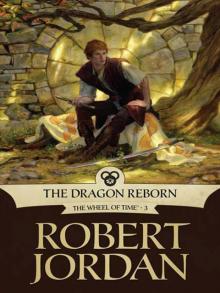 The Dragon Reborn
The Dragon Reborn The Fires of Heaven
The Fires of Heaven Winter's Heart
Winter's Heart Lord of Chaos
Lord of Chaos The Shadow Rising
The Shadow Rising Conan the Defender
Conan the Defender The Strike at Shayol Ghul
The Strike at Shayol Ghul The Path of Daggers
The Path of Daggers A Memory of Light
A Memory of Light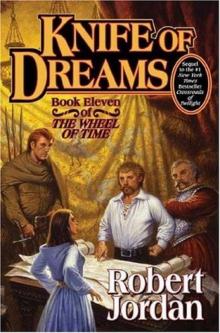 Knife of Dreams
Knife of Dreams Crossroads of Twilight
Crossroads of Twilight Conan the Invincible
Conan the Invincible The Gathering Storm
The Gathering Storm Warrior of the Altaii
Warrior of the Altaii A Crown of Swords
A Crown of Swords The Wheel of Time
The Wheel of Time Towers of Midnight
Towers of Midnight Conan Chronicles 2
Conan Chronicles 2 Conan the Magnificent
Conan the Magnificent New Spring
New Spring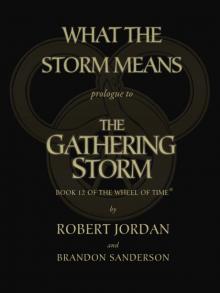 What the Storm Means
What the Storm Means A Memory of Light twot-14
A Memory of Light twot-14 New Spring: The Novel
New Spring: The Novel Towers of midnight wot-13
Towers of midnight wot-13 A Memory Of Light: Wheel of Time Book 14
A Memory Of Light: Wheel of Time Book 14 A Crown of Swords twot-7
A Crown of Swords twot-7 Lord of Chaos twot-6
Lord of Chaos twot-6 The Great Hunt twot-2
The Great Hunt twot-2 The Shadow Rising twot-4
The Shadow Rising twot-4![Wheel of Time-11] Knife of Dreams Read online](http://i1.bookreadfree.com/i1/04/03/wheel_of_time-11_knife_of_dreams_preview.jpg) Wheel of Time-11] Knife of Dreams
Wheel of Time-11] Knife of Dreams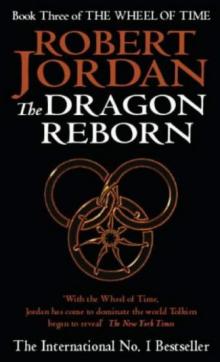 The Dragon Reborn twot-3
The Dragon Reborn twot-3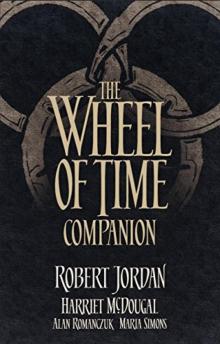 The Wheel of Time Companion
The Wheel of Time Companion The Fires of Heaven twot-5
The Fires of Heaven twot-5 Prologue to Towers of Midnight
Prologue to Towers of Midnight The Path of Daggers - The Wheel of Time Book 8
The Path of Daggers - The Wheel of Time Book 8 The Path of Daggers twot-8
The Path of Daggers twot-8 By Grace and Banners Fallen: Prologue to a Memory of Light
By Grace and Banners Fallen: Prologue to a Memory of Light Crossroads of Twilight twot-10
Crossroads of Twilight twot-10 The Gathering Storm twot-12
The Gathering Storm twot-12 Winter's Heart twot-9
Winter's Heart twot-9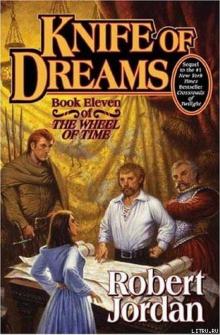 Knife of Dreams twot-11
Knife of Dreams twot-11 New Spring: The Novel (wheel of time)
New Spring: The Novel (wheel of time)